In this episode, we dive into the importance of selecting the right attribution model to better understand which marketing efforts […]
In this episode, we dive into the importance of selecting the right attribution model to better understand which marketing efforts […]
In this episode, we break down the importance of having a clear and strategic marketing budget framework to guide your […]
In this episode, we explore how businesses can leverage intent data for lead targeting to sharpen their prospecting and drive […]
Uncover the top 5 AI challenges in marketing and learn how to solve them with better strategy, stronger tools, and aligned team execution.
CMOs looking to improve ROAS should rethink video. This article outlines why social content repurposing is killing performance and what to do instead.
The post The Strategy Gap: Social Video Is Not PPC Video appeared first on Search Engine Journal.
As AI reshapes buying behavior, marketers need smarter insights. Here’s how to keep up.
The post How Enterprise Search And AI Intelligence Reveal Market Pulse appeared first on Search Engine Journal.
The post Google Analytics Secrets for Online Stores appeared first on Ultraise.


Ever scrolled through Instagram Reels and thought, “Wait, everyone’s using that same sound… and I can’t get enough of it!”
That’s actually how I discovered Makeba by Jain back in 2023. Even though the song was originally released in 2015, it exploded years later on Instagram Reels thanks to a now-iconic combo: that beat paired with Bill Hader’s perfectly timed dance moves.
I couldn’t stop watching. Every time that audio popped up, I had to see what someone had done with it. The track has lived rent-free in my head ever since — which speaks to the power of trending audio on Instagram.
So, whether you’re a creator trying to grow your following, a social media manager aiming to boost engagement, or a small business owner looking to connect with more people, finding trending audio on Instagram can be a simple (and surprisingly fun) way to get your content in front of new eyes.
Wondering how to find trending audio on Instagram?
In this post, I’ll walk you through 10 easy ways to find trending audio on Instagram, plus some tips to help you take the trend and make it your own.
[call out] Looking for the top 15 trending sounds on Instagram right now? Stay top of the pops and on top of the trends with the latest list.
Social media moves, so don’t sleep on these 10 ways to find the perfect sound for your next Insta post.
Instagram’s trending audio list shows you the top trending sounds that are gaining popularity fast on Instagram, updated every few days. Think of it like a live leaderboard of sounds everyone’s loving right now.
Here’s how to find it:


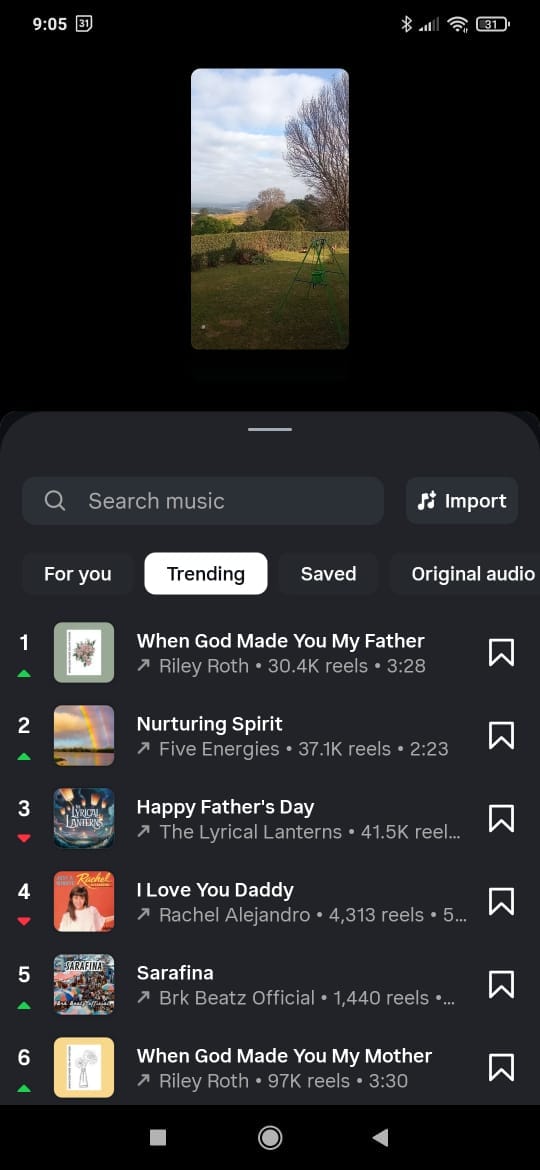

(As you can see, I posted this reel around Father’s Day.)
Pro tip: Not ready to use a song just yet? Tap the bookmark icon to save it for later. When you’re ready to post, head to the Saved tab to find all your faves in one place.
How to access saved songs on Instagram
If a sound disappears from your Saved list, it’s probably due to licensing changes, or it’s been removed from Instagram. In that case, check the creator’s original reel to either save it again or use an alternative.
If you’re not ready to create your post yet, another way to get the list of trending audio on Instagram is through the professional dashboard.
Note: For now, this feature is only available for professional Instagram accounts on the Instagram mobile app in the US.
Here’s how to find trending audio on Instagram with a professional account:
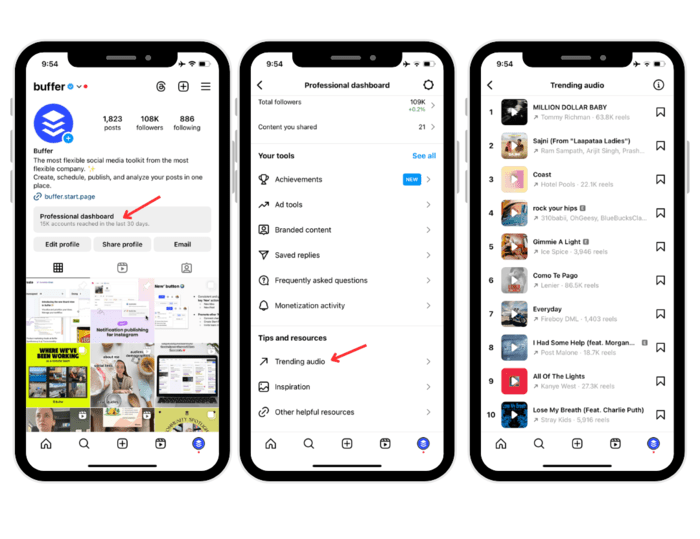

Just scrolling for now? Here’s another great way to identify the latest trending sounds on Instagram if you’re not in posting mode: If you see an upward arrow (↗️) instead of the usual music notes next to an audio track, that means it’s trending.
Tap the track to explore.
When you’re watching a reel, tap the audio name to view how many people are using it and get the option to use or save it.
You have no idea how happy it made my millennial heart to discover that Alice DJ’s Better Off Alone is trending.*stops writing blog post for spontaneous dance break.*
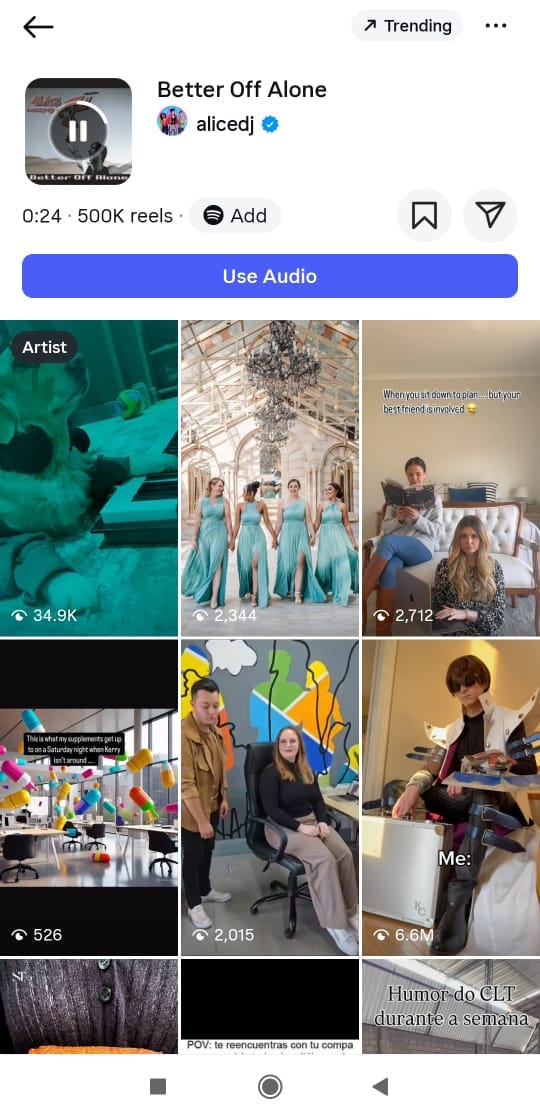

Pro tip: You can also add the song on Spotify using the little Add button. (Of course, this one is already in my Liked Songs.)
While this method of finding trending sounds on Instagram isn’t a perfect science, it’s a good way to find trending audio that’s popular outside your usual feed, and maybe even discover something a little unexpected.
Here’s how:
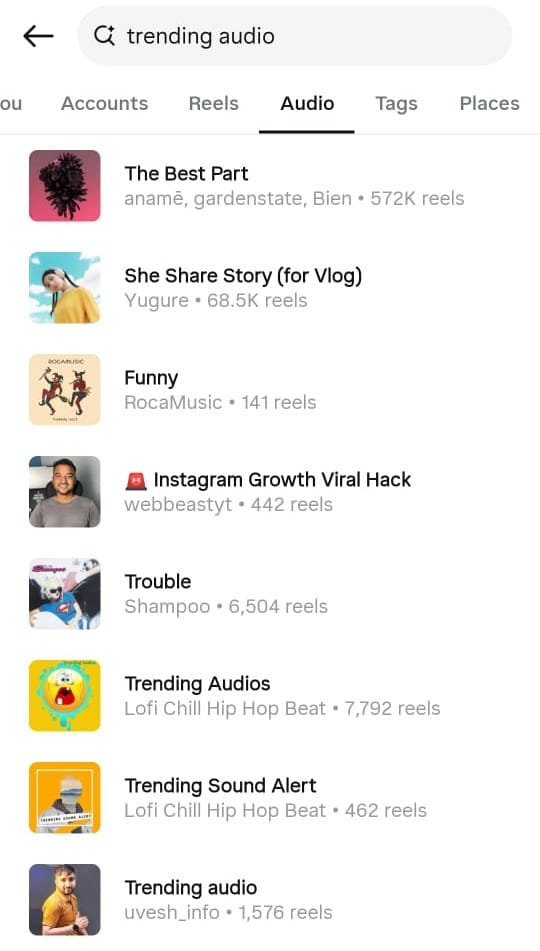

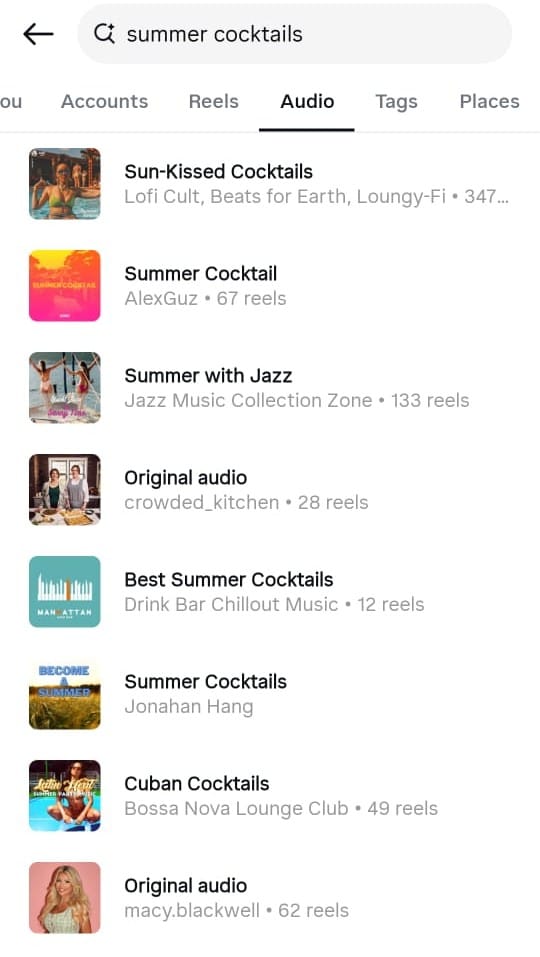

But, as mentioned earlier, this method isn’t foolproof.
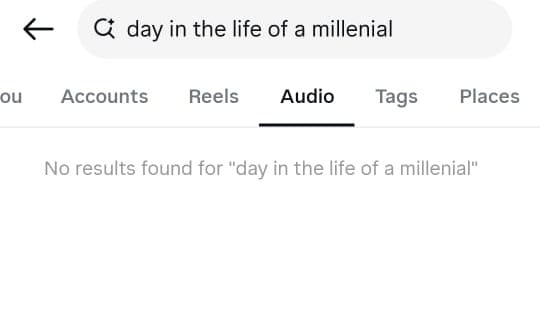

Instagram’s @creators account is a wealth of great info and ideas for Instagram growth. They regularly publish a reels trends carousel that shares not only the latest and greatest top trending sounds creators are using, but editing tips and tricks, too.
Check out the IG Anthems story highlight.
Pro tip: Join the Creators broadcast channel to get news of Instagram’s latest features and trends sent straight to your Instagram inbox. Sign up here.
Looking for a guilt-free reason to scroll?. As you swipe through Instagram Reels, keep an ear out for audio you hear more than once. If a sound keeps popping up (especially in totally different types of content), it’s a good sign it’s trending.
Bonus points if creators are putting their own spin on the sounds — that usually means the sound has some staying power and flexibility.
So go ahead, call it research. 😉
[call out] Take your reels game to the next level. Here are some Instagram tips, strategies, and hacks to create, edit, and distribute your Instagram Reels in 2025.
Want a shortcut to what’s hot across social platforms? Tools like ReelTrends and TrendTok Analytics track trending audio across Instagram, TikTok, and YouTube, showing you:
Many of these tools also let you filter by region, category, or niche, so you can tailor what’s trending to your audience.
Note: Both apps are only available on the App Store for iPhone.
A lot of trending audio starts on TikTok or YouTube Shorts before landing on Instagram, so keep an eye out there to give you a head start.
To find trending reels audio on YouTube Shorts:
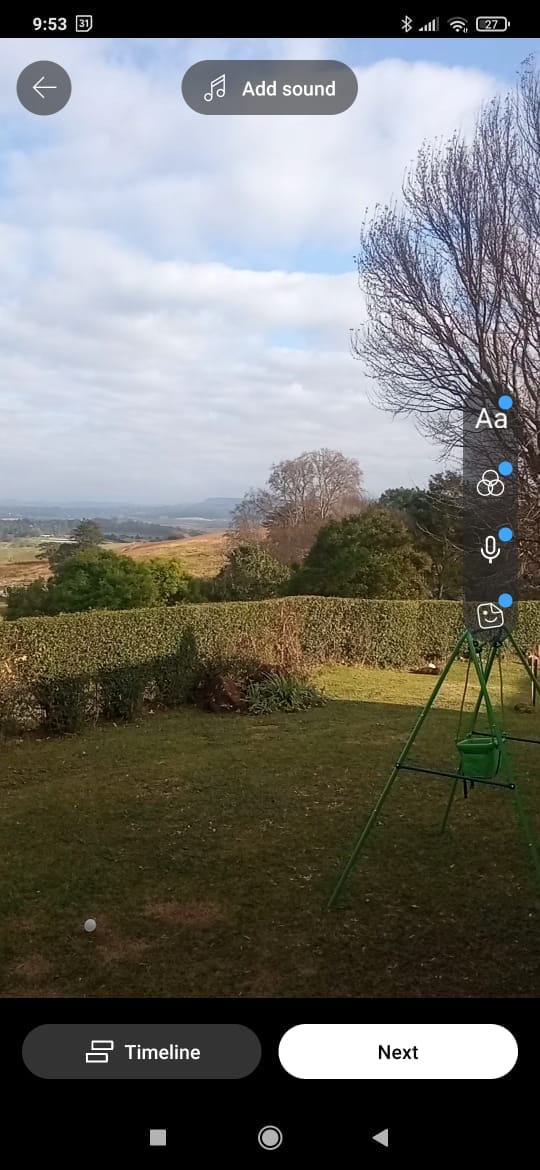

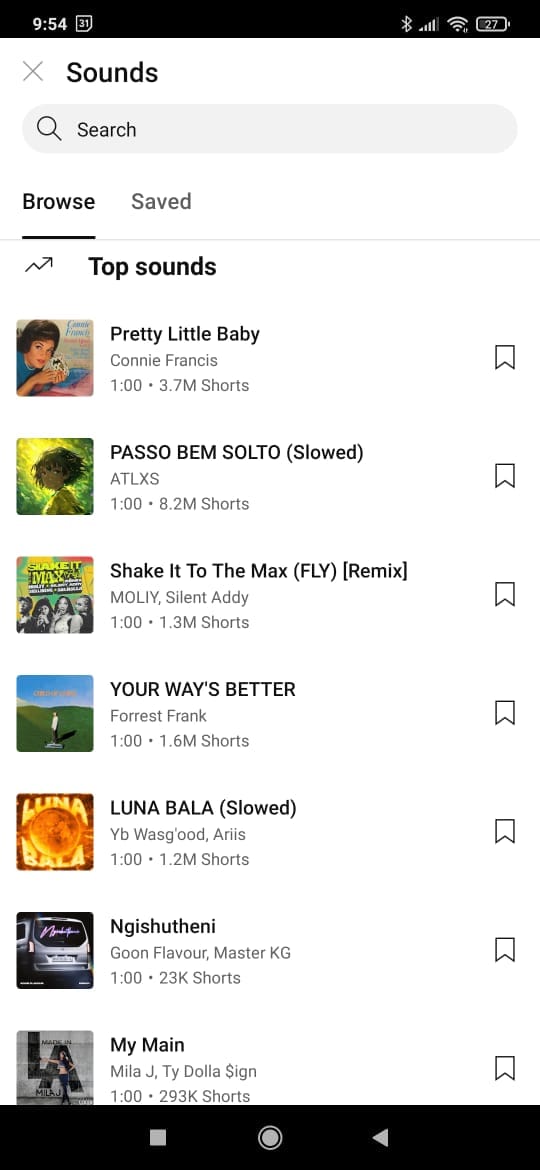

Let us do the trend-hunting for you. We keep a running list of the hottest Instagram sounds so you don’t have to chase trends from scratch every time you post.
Whether you’re batch-creating content, stuck in a scroll spiral, or just want to stay inspired, our list is here to help.
Pro tip: Bookmark the page so you can pop back in anytime you need a little trending audio inspo.
Finding trending audio on Instagram is one of the best ways to boost your content’s reach and stay current with what’s capturing people’s attention.
When you use a sound that’s gaining traction, your Instagram content has a better chance of being shown to more users, especially if the algorithm sees others interacting with that same viral audio.
One of the joys of Instagram Reels is seeing how different Instagram creators interpret the same audio in their own way. Whether it’s funny, heartfelt, or clever, your version adds to the conversation, and viewers love the variety.
Staring at a blank screen? Finding trending audio on Instagram can be the perfect spark to get your creativity flowing, offering some structure without boxing you in.
Pro tip: You can also save time (and prevent the blank screen effect) by using Buffer’s customizable templates. They’re a great starting point for posts, stories, and more.


I’ve been using templates in the latest Creator Camp challenge. Even if I end up tweaking the template, it still gets me out of writer’s block and into creator mode.
Using current sounds on Instagram shows that you’re paying attention, participating, and present.
When you use trending music, you’re potentially joining a larger conversation, challenge, or even a viral moment. It’s a chance to collaborate, connect, and be seen by new audiences.
Instagram rewards users who engage with its newest tools. It’s a subtle signal to the algorithm that you’re here, you’re creating, and you’re playing by their rules (in the best way).
Let’s be honest, sometimes it’s just fun to jump in on a trend, try something silly, or flex your creativity. Not everything has to be strategic. Enjoying the process makes your content more engaging, too.
Want to make the most of trending audio on Instagram? These top tips will help you use it in a way that feels authentic, creative, and gets your content seen.
Instagram loves originality, even when you’re jumping on a trend. Use trending audio, but add your own spin, story, or style to make it feel uniquely you.
Use the remix feature to create a side-by-side video with existing content. It’s a fun way to react, add context, or show your take with humour, insight, or personality.
Make sure your content follows Instagram’s recommended dimensions (9:16 for Instagram Reels) and specs. It keeps your videos looking crisp and professional across devices.
Not every trend is the right fit, and that’s OK. Focus on audio that aligns with your brand, message, or audience, so your content still feels on-brand and relevant.
On-screen text helps grab attention, explain your angle, and keep people watching. It’s especially helpful if your audio doesn’t immediately explain what the video is about. Use it alongside a snappy caption.
If you’re inspired by another creator, show some love with a tag or mention. It builds community and keeps your creative karma in good standing.
Trends move fast. Using audio early in its rise to the top gives you the best chance to reach a wider audience before it becomes overplayed.
Pro tip: For added reach, don’t forget to share your Instagram posts to your stories.
Post your content on Instagram when your audience is most active to give your content the best chance of being seen and engaged with. We analyzed over 2 million posts to help you do just that.
At the end of the day, Instagram Reels and Stories are meant to be playful and creative. Don’t stress about perfection; rather, enjoy the process and let your personality shine through. If you’re feeling a little apprehensive, try a trial reel and see how it lands.
Pro tip: Use Buffer’s Create Space to store trending sounds or Instagram Reels ideas for later, and when you’re ready to post, our notification publishing makes it easy to schedule everything ahead of time and add the audio natively in Instagram with just a few taps.
[call out] Posting stories on the fly? There’s a better way. Schedule them like a pro in 2025 — we’ll show you how (it’s easier than you think). Here’s how to schedule Instagram Stories in 2025.
Not every trend is the right fit. To make the most of what’s trending (and avoid any cringey missteps), watch out for these common mistakes.
Just because a sound is trending doesn’t mean it aligns with your brand. Some trending audio might contain lyrics, memes, or associations that don’t sit well with your audience, or that could come off as insensitive, offensive, or wildly out of step with your usual tone.
Before you hit post, do a quick vibe check:
Timing matters. If a sound is already overused or has started to feel stale, using it might make your content feel behind the curve, not ahead of it.
Instead:
Business accounts on Instagram face different rules around audio. Some popular or trending songs may be restricted due to licensing, meaning you either won’t be able to use them, or your video could be muted or taken down after posting.
To stay safe:
One of the biggest missed opportunities is using a trending sound exactly the same way as everyone else.
Instead of copy-pasting what you’ve seen:
And, get this, sometimes not using trending audio is the trend! Check out this reel from @reelstips, which advocates stripping things back to the basics with your content’s original audio and background sound.
Whether you’re aiming for more reach, building community, or just having fun with your content, trending audio can give your Instagram strategy a fresh boost. And you don’t have to do it all on your own (or all at once).
A third-party social media scheduling tool like Buffer helps you take care of the admin side—like planning, scheduling, organizing your ideas, and analyzing your results—so you can stay focused on the creative stuff.
You bring the personality, let Buffer handle the planning.
Yes, business accounts can use some trending sounds, but other trending music tracks may have restrictions due to licensing. However, Instagram offers a wide library of audio for businesses, including trending sounds cleared for commercial use.
When you find a sound you like, just tap the audio title and hit the bookmark icon to save it. You can access all your saved sounds in the Saved tab when creating a new post.
Some sounds are restricted based on your account type, location, or copyright rules. If a sound isn’t available, try switching to a personal account or looking for royalty-free alternatives using the Meta Sound Collection.
Instagram’s trending audio list updates daily or every few days, so keep checking to find trending sounds before they peak.
Absolutely! Using trending sounds can boost your content’s reach by tapping into popular audio with the algorithm and audience. Just remember to keep it authentic and relevant to your brand.
For ads, it’s safest to use music licensed for commercial use. Some trending audio may not be cleared for ads, so check Instagram’s guidelines or use royalty-free tracks to avoid issues.
There’s no magic number, and it’s best not to use trending audio just for the sake of it. Browse the top songs and trending sounds, and see what inspires and resonates with you.
Pro tip: Leave room for original audio or voice-overs that showcase your unique brand voice.
You can check the Trending tab in Instagram’s music picker when creating Instagram Reels or posts, or use third-party tools like ReelTrends and TrendTok to track trending sounds.
Using a trending song can definitely boost your reel’s visibility, but it’s not a guaranteed ticket to going viral. Even if you know the Instagram algorithm inside and out, there are just no guarantees!
You’re in luck; we have a quick cheat sheet for you with current trending audio and viral sounds. Head over to our regularly updated list to find trending songs for your content.

